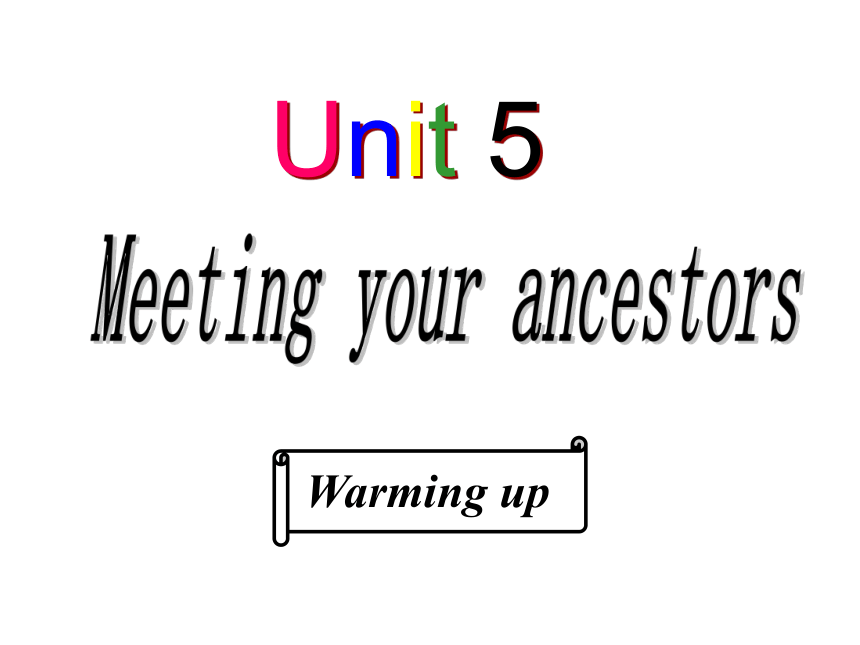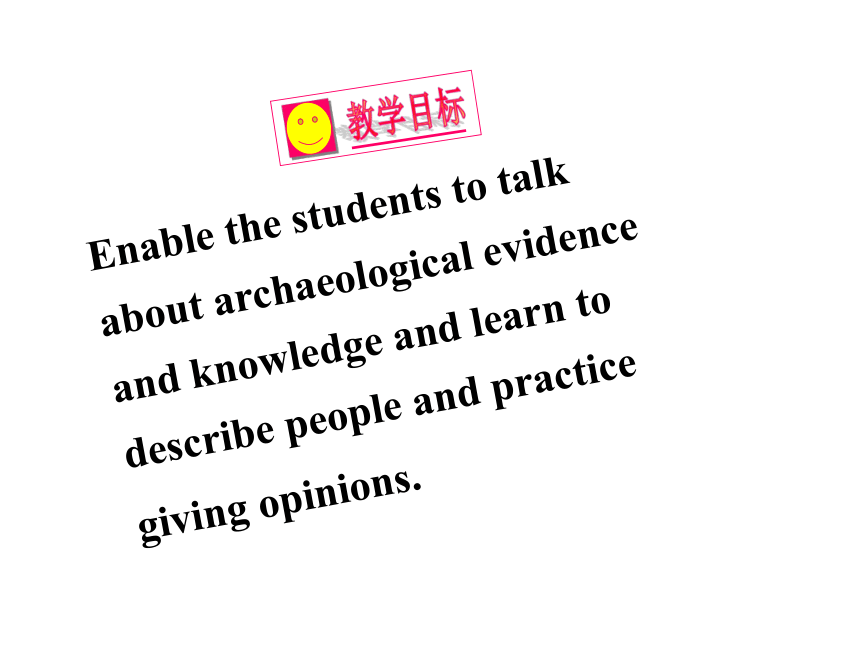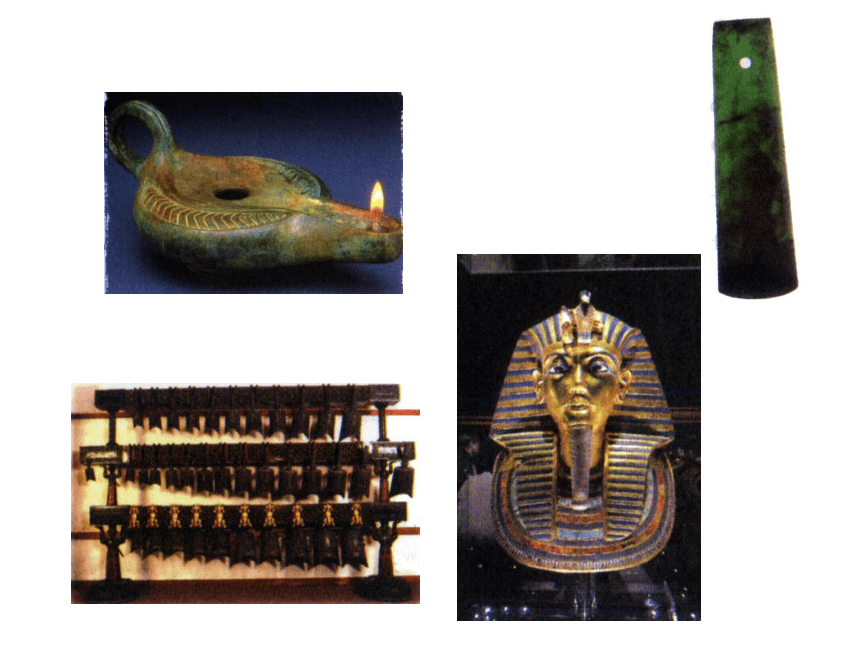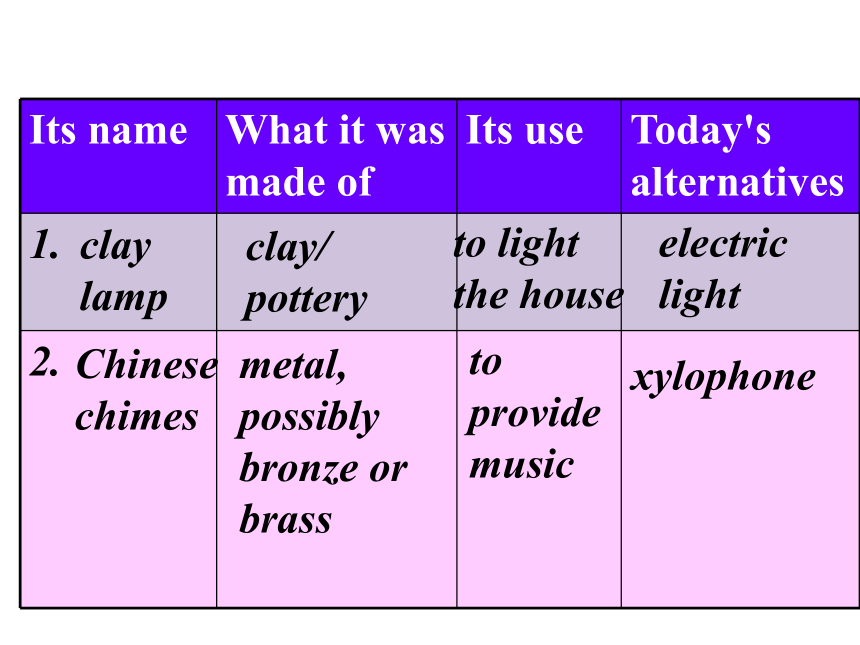人教版高中英语选修八 Unit5 Meeting your ancestors warming up课件(共17张PPT )
文档属性
| 名称 | 人教版高中英语选修八 Unit5 Meeting your ancestors warming up课件(共17张PPT ) |

|
|
| 格式 | zip | ||
| 文件大小 | 906.6KB | ||
| 资源类型 | 教案 | ||
| 版本资源 | 人教版(新课程标准) | ||
| 科目 | 英语 | ||
| 更新时间 | 2019-03-04 00:00:00 | ||
图片预览







文档简介
课件17张PPT。新课标高二版.选修八Unit 5Meeting your ancestorsWarming upEnable the students to talk about archaeological evidence and knowledge and learn to describe people and practice giving opinions. What are they? (Try to identify these objects (P37). Discuss what they may have been made of and explain their use. Think of the alternatives we would use today.)Warming upWhen you have come to conclusion, fill in the chart below. Then report to the class.Warming upclay
lampChinese chimesclay/
potteryto light
the houseelectric
lightmetal, possibly bronze or brassto provide musicxylophonestone/ jade axe stone/ jade to chop woodchain sawdeath maskgoldto cover the face of the pharaoh after his death none Zhoukoudian is a relic of primitive culture, 48 kilometers southwest of downtown Beijing, where Longgushan (dragon skeleton mountain) is standing. Several decades ago, local farmers Tell what you have known about Zhoukoudian Caves. mined lime-stone in Zhoukoudian, came upon some bone fossils and called them “the Dragon Bones”. Zhoukoudian became known as “Dragon Bone Mountain”. Drugstores purchased the bones as a medical ingredient. The news about the “magic bones” drew attention of scientists. In 1929 these lime-stone caves became world famous with the discovery of a skull and two teeth dating back 200,000 to 500,000 years. They were named Peking Man. But the fossils were lost during World War II. Many of the implements used by those early humans, and bones of animals they hunted are on display at a museum near the site of the discovery.
With the steadily increased number of visitors from all over the world, Zhoukoudian has become a scenic spot of Beijing. Now read the dialogue aloud please.Archaeologists study early people by examining the objects they used. Look at the pictures in the reading passage and think about what kind of life Peking man lived? Did they suffer from cold, starvation or disease? Make a tentative guess about what Peking man may have done and used thousands of years ago. Compare their life with ours today. Then read the passage to see how accurate you were. Preview the 2 reading materials in SB.
lampChinese chimesclay/
potteryto light
the houseelectric
lightmetal, possibly bronze or brassto provide musicxylophonestone/ jade axe stone/ jade to chop woodchain sawdeath maskgoldto cover the face of the pharaoh after his death none Zhoukoudian is a relic of primitive culture, 48 kilometers southwest of downtown Beijing, where Longgushan (dragon skeleton mountain) is standing. Several decades ago, local farmers Tell what you have known about Zhoukoudian Caves. mined lime-stone in Zhoukoudian, came upon some bone fossils and called them “the Dragon Bones”. Zhoukoudian became known as “Dragon Bone Mountain”. Drugstores purchased the bones as a medical ingredient. The news about the “magic bones” drew attention of scientists. In 1929 these lime-stone caves became world famous with the discovery of a skull and two teeth dating back 200,000 to 500,000 years. They were named Peking Man. But the fossils were lost during World War II. Many of the implements used by those early humans, and bones of animals they hunted are on display at a museum near the site of the discovery.
With the steadily increased number of visitors from all over the world, Zhoukoudian has become a scenic spot of Beijing. Now read the dialogue aloud please.Archaeologists study early people by examining the objects they used. Look at the pictures in the reading passage and think about what kind of life Peking man lived? Did they suffer from cold, starvation or disease? Make a tentative guess about what Peking man may have done and used thousands of years ago. Compare their life with ours today. Then read the passage to see how accurate you were. Preview the 2 reading materials in SB.
